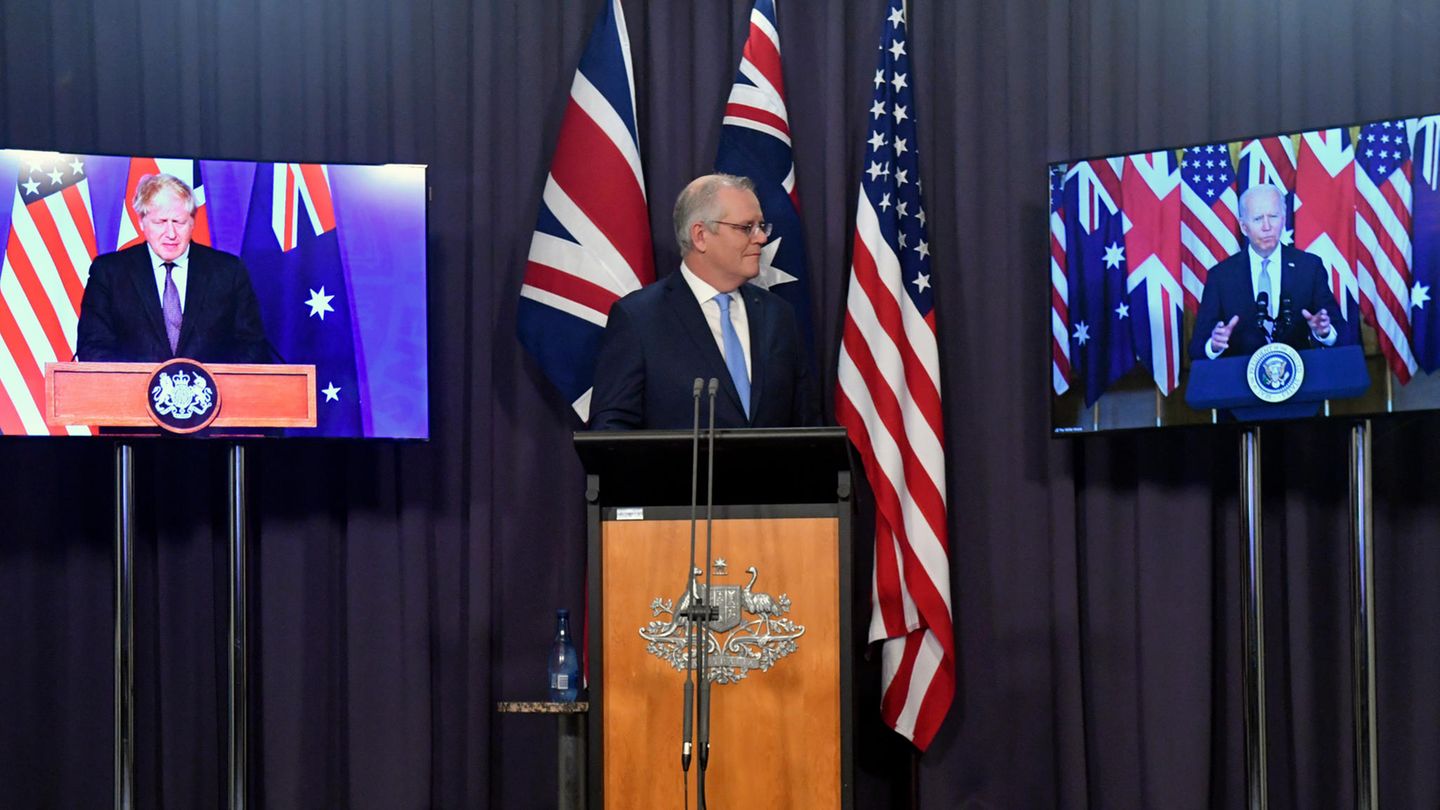In view of Beijing’s increasing claim to power, the US wants to step up its deployment in the Indo-Pacific region. For this, the ally Australia should get access to secret nuclear technology for submarines. But some partners are angry.
In view of China’s increasing demonstration of power, the United States and Great Britain want to support Australia in strengthening security in the Indo-Pacific region. The US government therefore wants to enable Australia to acquire nuclear-powered submarines to strengthen security and military deterrence in the Indo-Pacific region. US President Joe Biden spoke of “rapidly evolving threats” in Washington on Wednesday afternoon (local time). Together with Great Britain, an optimal way is to be found in the next 18 months to equip Australia with the modern submarines, according to a joint communication from Biden, the Australian Prime Minister Scott Morrison and the British Prime Minister Boris Johnson.
The US government had previously agreed to share this “extremely confidential” technology, a senior White House official said earlier. The initiative is part of a new “security partnership” between the three states for peace and stability in the Indo-Pacific region. It should be called “AUKUS” based on the English abbreviations of the participating countries.
Meet “Today’s and Tomorrow’s Threats”
The initiative is a “historic step,” said Biden. However, he emphasized that this was not about nuclear armed submarines for Australia. “These are conventional submarines that are nuclear powered,” said Biden. The Australian Prime Minister Morrison announced that the submarines should be built in Adelaide.
Australia, but also the USA, are looking at the emergence of economically and militarily emerging China with increasing concern. Morrison said the new tripartite alliance should help address the “challenges” in the “increasingly complex” Indo-Pacific region. Australia will also receive new Tomahawk cruise missiles from the USA. Biden, Morrison and Johnson did not mention China themselves when they were video-posted.
“We need to be able to deal with both the current strategic environment in the region and its possible developments,” said Biden. An open and free Indo-Pacific region is crucial for the future and must endure. It is now a matter of connecting the allies of the US in new ways and strengthening the ability to work together. The “threats of today and tomorrow” must be countered.
China is outraged
British Prime Minister Johnson emphasized that it is one of the most complex and technically demanding projects in the world, which will stretch over decades and require the most advanced technology. The initiative shows how deep the friendship and how great the trust is between the three countries. “Only a handful of countries have nuclear-powered submarines, and it is a momentous decision for any nation to acquire this tremendous skill,” said Johnson.
Submarines powered by a nuclear reactor would enable Australia to operate submarines continuously for longer, they are also quieter and have more capabilities than those of conventional design, the White House had previously said.
China was outraged by the plan. “The countries concerned should give up the cold war’s zero-sum mentality,” said a foreign ministry spokesman in Beijing on Thursday. Otherwise, they will only end up harming their own interests. The spokesman also pointed out that Australia was a state without nuclear weapons that could suddenly import nuclear-powered submarine technology with strategic military value. This could induce other states in the international community to question their commitment to the non-proliferation of nuclear weapons. China itself has long been a nuclear power.
France’s Foreign Minister: “I’m angry”
France was also angry. In 2016, Australia signed a multi-billion dollar contract with France to build twelve new submarines. The deal must now give way to the new initiative. Morrison said he had already informed the French defense company Naval Group and President Emmanuel Macron of the decision. “I want to stress that France remains an incredibly important partner in the Pacific,” he said. “But as Prime Minister, I have to make decisions that benefit Australia’s national security, and I know France would do the same. And I know that will ultimately be understood.”
“This is a decision against the spirit and content of cooperation between France and Australia, which is based on political trust and the development of a high-quality defense industry in Australia,” said Foreign Minister Jean-Yves Le Drian and Defense Minister Florence Parly on Thursday in Paris. A European partner like France is simply being pushed aside.
Le Drian also made no secret of his anger on the radio station France Info: “I’m angry. You don’t do that among allies,” said the Foreign Minister. “That’s a slap in the back.” He spoke of a “one-sided, brutal and unpredictable decision”. It reminds you strongly of the appearance of the former US President Donald Trump. “We have built a relationship of trust with Australia. That trust has been betrayed.” The Australians would now have to explain how they wanted to get out of this. “We’re not done with the story yet.”
New Zealand does not want nuclear submarines in its waters
In New Zealand, too, people are not particularly happy about their neighbors’ nuclear submarines. The island nation does not want to allow nuclear-powered Australian submarines access to its waters. Prime Minister Jacinda Ardern announced this on Thursday. “New Zealand’s position on banning nuclear-powered submarines in our waters remains unchanged,” said Ardern in the capital Wellington. New Zealand sees foreign policy developments “always with an eye on what is in the best interests of the region”. The island nation strictly rejects nuclear power.
Unlike Great Britain, Australia is not a member of the western defense alliance NATO, but is considered a close partner of the organization. Australia has participated in NATO military operations in Afghanistan and Iraq. In addition to the bilateral relationship, the USA and Australia are also linked by the so-called “five eyes” partnership of the secret services. The alliance includes Australia, New Zealand, Canada, Great Britain and the USA.
Biden also relies on an alliance called “Quad” for security and cooperation in the Indo-Pacific. The quartet includes Australia, India, Japan and the USA.
David William is a talented author who has made a name for himself in the world of writing. He is a professional author who writes on a wide range of topics, from general interest to opinion news. David is currently working as a writer at 24 hours worlds where he brings his unique perspective and in-depth research to his articles, making them both informative and engaging.




